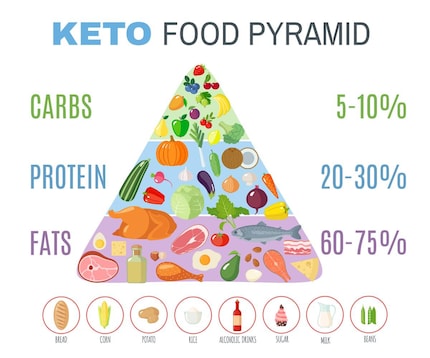

Weight loss: can ketones really turbocharge your metabolism?
Ketones are said to be turbo fat-burners that help you lose weight. But is there any truth to the claims? Read on to find out what ketones actually are, how they work and what risks you should be aware of.
By now, you’re bound to have heard about the ketogenic (keto) diet. Maybe you’re wondering whether it’s worth switching to keto. You might even be considering using ketones as a weight loss supplement. Products currently being touted online, such as raspberry ketones, promise speedy results. But how much substance is there to these claims? And how much of the hype is down to clever marketing? Let’s dive into the science, the myths and the potential risks to your health.
Ketosis: when your body burns fat instead of sugar
In a nutshell, the keto diet involves very few carbs and lots of fat (website in German). This is done to encourage the body to obtain energy from fat instead of sugar. If you completely give up the likes of bread, pasta and rice, your sugar stores are emptied. Then, your liver steps in and converts fat into ketone bodies, supplying your brain and muscles with energy. This metabolic state is known as ketosis, which is exactly what the keto diet is based on.
The dos and don’ts of a keto diet
The cornerstone of a ketogenic diet is eating as few carbohydrates as possible, focusing instead on consuming lots of fat and moderate amounts of protein. This is what triggers your body to switch to burning fat. Basically, that means you can eat plenty of avocado, eggs, fish, meat, cheese, nuts and green vegetables, all of which provide you with key nutrients and keep you in ketosis.

Source: romawka/Shutterstock
High-fat foods such as olive oil, coconut oil or butter, which cover your fat requirements, are the main component of a keto diet. Green leafy veggies such as spinach or broccoli are ideal as they hardly contain any carbohydrates and provide plenty of vitamins.
As far as keto no-nos are concerned, you should steer clear of carbohydrate-rich foods such as bread, pasta, rice, potatoes and most types of fruit, including bananas, mangoes, apples and pears. Sugary foods and sweets are off the menu, as they quickly raise your blood sugar and prevent ketosis.
Science or myth?
«You lose weight faster on a keto diet.»
Many people really do lose weight during the first few weeks of following a keto diet. That’s mainly because the body initially excretes water. It’s also because excluding high-calorie foods often means your daily calorie intake drops. In the long term, however, the results are usually similar to those of other diets (website in German).
«Keto is suitable for everyone.»
Not everyone should try keto. The diet isn’t suitable for pregnant women, breastfeeding mothers, children and people with certain pre-existing conditions. By heavily restricting carbs and creating metabolic changes, the ketogenic diet can cause nutrient deficiencies, growth disorders or health complications, which are particularly risky at these stages of life or in people with pre-existing conditions.
«You’ll shed the pounds with raspberry ketones.»
Raspberry ketones are often advertised as slimming agents, but there’s no scientific evidence of that in humans. Most studies so far have been carried out on animals, so the «Verbraucherzentrale» consumer rights watchdog has issued warnings against raspberry ketone products (website in German).
What’s the story behind the raspberry ketone trend?
Raspberry ketones sound harmless at first. After all, real raspberries contain them too (in very low concentrations). As aromatic substances, raspberry ketones give the berries their characteristic scent. Extracting natural raspberry ketones, however, is extremely expensive. As a result, they’re produced artificially as food supplements, which are then sold in pill or powder form as so-called fat burners. The things they promise – fast fat-burning, reduced hunger and effortless weight loss – sound too good to be true.
And as a matter of fact, there’s no scientific evidence for any of these effects in humans. The few studies that do exist have only been carried out on animals, and even those results are disputed. If you choose to take magic pills you’ve bought online, you’re taking a real risk. Products like these can have unpleasant or even dangerous side effects, including raising blood pressure or putting increased strain on the heart.
What’s more, many of these capsules and powders aren’t even approved in Europe. They’re considered untested, novel foodstuffs – which is exactly why countless products have already been pulled from the market.
The consumer rights watchdog hits the nail on the head by saying: «We can’t gauge the risks, the benefits are unproven – and raspberry ketone products are anything but a secret trick to achieving a slimmer waistline.»
The transition to keto might not be smooth
Many people who make the switch from pasta and bread to avocado and nuts come down with the so-called keto flu after just a few days. Typical symptoms in the first week of the diet include headaches, tiredness and difficulty concentrating. These usually disappear after three to five days, but in rare cases, they last up to two weeks. The symptoms flare up when the metabolism is adapting to the reduction in carbohydrates and using fat as fuel (website in German).
As bread, fruit and many vegetables are removed from the diet, this can lead to a deficiency in fibre, vitamins and minerals (website in German). Potential consequences of this include constipation, muscle cramps and skin problems.
Diets very high in fat can also damage the cardiovascular system in the long run. There’s evidence they can raise blood lipid and cholesterol levels, in turn increasing the risk of cardiovascular disease.
So, if you switch to a ketogenic diet, you should pay attention to what your body’s telling you. You should also review your nutrition regularly, preferably with professional help.
Science editor and biologist. I love animals and am fascinated by plants, their abilities and everything you can do with them. That's why my favourite place is always the outdoors - somewhere in nature, preferably in my wild garden.
Practical solutions for everyday problems with technology, household hacks and much more.
Show all




